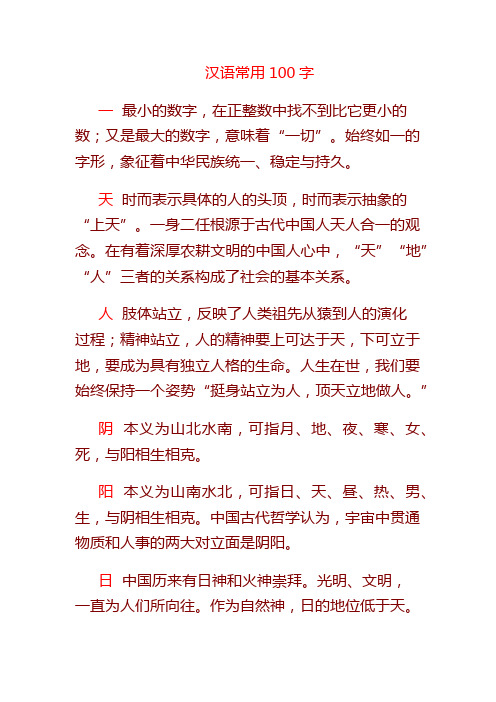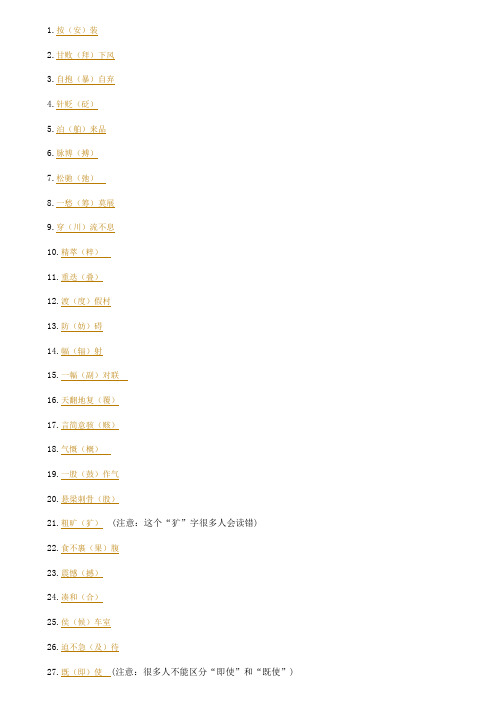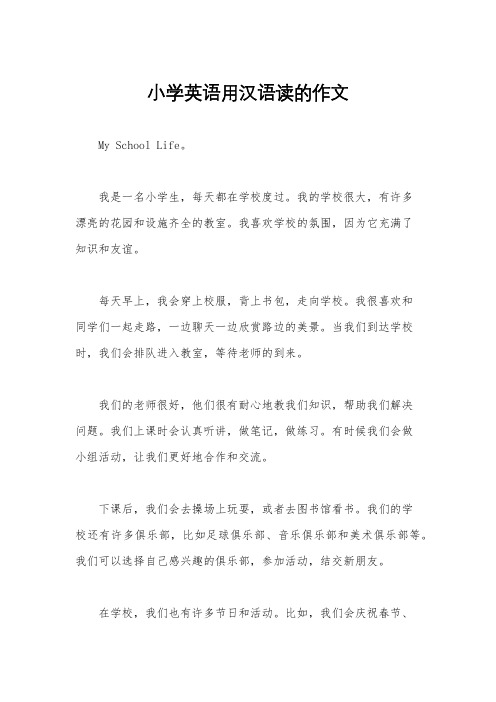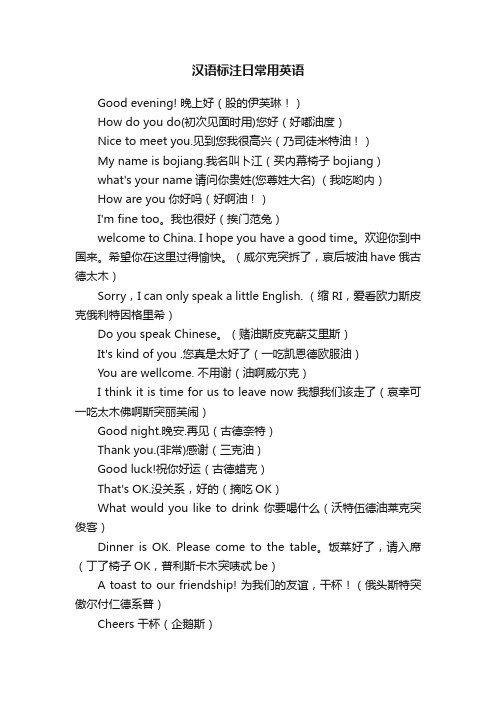汉语常用一百字(附英语)
100个中国常用语

100个中国常用语,英语是这样翻译—长知识了!中华文化博大精深,成语俗语都是智慧结晶,但翻译成英文如果表达不当,却容易引起误解。
所以,一起来学学常见中文成语的英译很有必要!01爱屋及乌Love me, love my dog.02百闻不如一见One look is worth a thousand words.Seeing is believing.03比上不足,比下有余to fall short of the best, but be better than the worst04笨鸟先飞A slow sparrow should make an early start.05不遗余力spare no effort; go all out; do one's best06不打不成交No discord, no concord.07拆东墙补西墙rob Peter to pay Paul08辞旧迎新bid farewell to the old and usher in the new09大事化小,小事化了try first to make their mistake sound less serious and then to reduce it to nothing at all10大开眼界broaden one's horizon; be an eye-opener11国泰民安the country flourishes and people live in peace12过犹不及going beyond the limit is as bad as falling short; excess is just as bad as deficiency;too much is as bad as too little13好了伤疤忘了疼once on shore, one prays no more14好事不出门,坏事传千里Bad news travels fast.15和气生财harmony brings wealth;friendliness is conducive to business success16活到老学到老never too old to learn17既往不咎let bygones be bygones18金无足赤,人无完人There are spots even on the sun.19金玉满堂Treasures fill the home.20脚踏实地be down-to-earth21脚踩两只船sit on the fence; be a fence-sitter; have a foot in either camp君子之交淡如水A hedge between keeps friendship green.23老生常谈,陈词滥调cut and dried; cliché24礼尚往来Courtesy calls for reciprocity.25留得青山在,不怕没柴烧Where there is life, there is hope.26马到成功achieve immediate victory; win instant success27名利双收gain both fame and wealth28茅塞顿开be suddenly enlightened29没有规矩,不成方圆Nothing can be accomplished without norms or standards.每逢佳节倍思亲On festive occasions more than ever one thinks of one's dear ones far away. 31谋事在人,成事在天Man proposes; God disposes.32弄巧成拙make a fool of oneself in trying to be smart33赔了夫人又折兵suffer a double loss; lose the bait along with the fish34抛砖引玉a modest spur to induce others to come forward with valuable contributions; throw a sprat to catch a whale35破釜沉舟cut off all means of retreat;burn one's own way of retreat and be determined to fight to the end36抢得先机take the preemptive opportunities37巧妇难为无米之炊One can't make bricks without straw.38千里之行始于足下a thousand-li journey begins with the first step--the highest eminence is to be gained step by step39前事不忘,后事之师Past experience, if not forgotten, is a guide for the future.40前怕狼,后怕虎fear wolves ahead and tigers behind;hesitate in doing something41强龙难压地头蛇The mighty dragon is no match for the native serpent.42瑞雪兆丰年A fall of seasonal snow gives promise of a fruitful year43人逢喜事精神爽People are in high spirits when involved in happy events.44世上无难事,只怕有心人Where there is a will, there is a way.45世外桃源a retreat away from the turmoil of the world46人之初,性本善Humans are born good.47上有天堂,下有苏杭Just as there is paradise in heaven, there are Suzhou and Hangzhou on earth 48塞翁失马,焉知非福a blessing in disguise;Every cloud has a silver lining.49三十而立A man should be independent at the age of thirty. /At thirty, a man should be able to think for himself.50水涨船高A ship rises with the tide51时不我待Time and tide wait for no man.52杀鸡用牛刀use a steam-hammer to crack nuts53实事求是seek truth from facts; be practical and realistic; be true to facts 54说曹操,曹操到speak of the devil55实话实说speak the plain truth; call a spade a spade; tell it as it is56实践是检验真理的唯一标准Practice is the sole criterion for testing truth.57韬光养晦hide one's capacities and bide one's time58糖衣炮弹sugar-coated bullets59天有不测风云Anything unexpected may happen. a bolt from the blue60团结就是力量Unity is strength.61跳进黄河洗不清Even if one jumped into the Yellow River, one can not wash oneself clean - there's nothing one can do to clear one's name62歪风邪气unhealthy trends and vulgar practices63物以类聚,人以群分Birds of a feather flock together.64望子成龙hold high hopes for one's child65唯利是图seek nothing but profits; be blind to all but one's own interests66无中生有a sheer fabrication out of nothing; fabricate rumors out of thin air67无风不起浪There are no waves without wind. Nothing comes of nothing.68徇私枉法twist the law to suit one's own purpose69新官上任三把火a new broom sweeps clean70蓄势待发accumulate strength for a take-off71心想事成May all your wish come true72心照不宣have a tacit understanding; thoroughly understand each other, without having exchanged a word of explanation73先入为主First impressions are firmly entrenched.74先下手为强He who strikes first gains the advantage.The best defense is offense.75热锅上的蚂蚁ants on a hot pan76现身说法warn people by taking oneself as an example77息事宁人pour oil on troubled waters; patch up a quarrel and reconcile the parties concerned78循序渐进proceed in an orderly way and step by step; advance gradually in due order 79严以律己,宽以待人be strict with oneself and lenient with others80有情人终成眷属Jack shall have Jill, all shall be well.81有钱能使鬼推磨Money makes the mare go./ Money talks.82有识之士a man of insight83有勇无谋bold but not crafty84有缘千里来相会Separated as we are thousands of miles apart, we come together as if by predestination.85与时俱进keep pace with the times86以人为本people-oriented87因材施教teach students according to their aptitude88欲穷千里目,更上一层楼to ascend another storey to see a thousand miles further; Ascend further, were you to look farther.89欲速则不达Haste makes waste.More haste, less speed.90优胜劣汰survival of the fittest91英雄所见略同Great minds think alike.92冤家宜解不宜结Better make friends than make enemies.93cases in which people were unjustly, falsely or wrongly charged or sentenced; unjust, false or wrong cases94一言既出,驷马难追A promise is a promise.A real man never goes back on his words.95招财进宝bring in wealth and treasure96债台高筑become debt-ridden97众矢之的target of public criticism98纸上谈兵be an armchair strategist99纸包不住火You can't wrap fire in paper.What's done by night appears by day.100caught in a dilemma; between the devil and the deep blue sea。
中文常用语英文

1.元宵节:Lantern Festival2.刺绣:embroidery3.重阳节:Double-Ninth Festival4.清明节:Tomb sweeping day5.剪纸:Paper Cutting6.书法:Calligraphy7.对联:(Spring Festival) Couplets8.象形文字:Pictograms/Pictographic Characters9.人才流动:Brain Drain/Brain Flow10.四合院:Siheyuan/Quadrangle11.战国:Warring States12.风水:Fengshui/Geomantic Omen13.铁饭碗:Iron Bowl14.函授部:The Correspondence Department15.集体舞:Group Dance16.黄土高原:Loess Plateau17.红白喜事:Weddings and Funerals18.中秋节:Mid-Autumn Day19.结婚证:Marriage Certificate20.儒家文化:Confucian Culture21.附属学校:Affiliated school22.古装片:Costume Drama23.武打片:Chinese Swordplay Movie24.元宵:Tangyuan/Sweet Rice Dumpling (Soup)25.一国两制:One Country, Two Systems26.火锅:Hot Pot27.四人帮:Gang of Four28.诗经:The Book of Songs29.素质教育:Essential-qualities-oriented Education30.史记:Historical Records/Records of the Grand Historian31.大跃进:Great Leap Forward (Movement)32.西游记:The Journey to the West33.除夕:Chinese New Year’s Eve/Eve of the Spring Festival34.针灸:Acupuncture35.唐三彩:Tri-color Pottery of the Tang Dynasty/ The Tang Tri-colored pottery36.中国特色的社会主义:Chinese-charactered Socialist/Socialist with Chinese characteristics37. 偏旁:radical38. 孟子:Mencius39. 亭/阁:Pavilion/ Attic40. 大中型国有企业:Large and Medium-sized State-owned Enterprises41. 火药:gunpowder42. 农历:Lunar Calendar43. 印/玺:Seal/Stamp44. 物质精神文明建设:The Construction of Material Civilization and Spiritual Civilization45. 京剧:Beijing Opera/Peking Opera46. 秦腔:Crying of Qin People/Qin Opera47. 太极拳:Tai Chi48. 独生子女证:The Certificate of One-child49. 天坛:Altar of Heaven in Beijing50. 小吃摊:Snack Bar/Snack Stand51. 红双喜:Double Happiness52. 政治辅导员:Political Counselor/School Counselor53. 春卷:Spring Roll(s)54. 莲藕:Lotus Root55. 追星族:Star Struck56. 故宫博物院:The Palace Museum57. 相声:Cross-talk/Comic Dialogue58. 下岗:Lay off/Laid off59. 北京烤鸭:Beijing Roast Duck60. 高等自学考试:Self-taught Examination of Higher Education61. 烟花爆竹:fireworks and firecracker62. 敦煌莫高窟:Mogao Caves63. 电视小品:TV Sketch/TV Skit64. 香港澳门同胞:Compatriots from Hong Kong and Macao65. 文化大革命:Cultural Revolution66. 长江中下游地区:The Mid-low Reaches of Yangtze River67. 门当户对:Perfect Match/Exact Match68. 《水浒》:Water Margin/Outlaws of the Marsh69. 中外合资企业:Joint Ventures70. 文房四宝(笔墨纸砚):"The Four Treasure of the Study" "Brush, Inkstick, Paper, and Inkstone"71.兵马俑:cotta Warriors/ Terracotta Army72.旗袍:cheongsam。
汉语常用100字

汉语常用100字一最小的数字,在正整数中找不到比它更小的数;又是最大的数字,意味着“一切”。
始终如一的字形,象征着中华民族统一、稳定与持久。
天时而表示具体的人的头顶,时而表示抽象的“上天”。
一身二任根源于古代中国人天人合一的观念。
在有着深厚农耕文明的中国人心中,“天”“地”“人”三者的关系构成了社会的基本关系。
人肢体站立,反映了人类祖先从猿到人的演化过程;精神站立,人的精神要上可达于天,下可立于地,要成为具有独立人格的生命。
人生在世,我们要始终保持一个姿势“挺身站立为人,顶天立地做人。
”阴本义为山北水南,可指月、地、夜、寒、女、死,与阳相生相克。
阳本义为山南水北,可指日、天、昼、热、男、生,与阴相生相克。
中国古代哲学认为,宇宙中贯通物质和人事的两大对立面是阴阳。
日中国历来有日神和火神崇拜。
光明、文明,一直为人们所向往。
作为自然神,日的地位低于天。
作为时间单位,天和日有相似的意义。
日在天上运行,因此天日常用在同一词汇中。
月自然界的月亮一圆一缺相隔30天,与日相对应,是人们常见的自然现象。
关于月有不少美丽的神话传说,并通过对月变化的观察,产生了月蚀的知识和记载,以及对月的祭祀及礼仪等。
易易为变易,宇宙的本性就是差异、变化,没有两个时刻完全相同,人类的历史也是如此。
这是中国儒家世界观的第一信念,古往今来无人能将其颠覆。
化变是外在的,化是内在的。
文化、教化,都是内在的,现代的信息化,更是一种科技的大变革。
山地上所突兀者,人间所仰望者,为山。
山被中国人赞美成有脊梁的阳刚的代表,所以山就是男子的象征。
水五行之一,构成了中国古代朴素唯物主义的要素。
水是一种标准,也是一种境界。
老子“上善若水,水善利万物而不争”体现出道家“无为而求治”的哲学思想。
禅是中国化的佛,是神圣巅峰的封号,是超越言语的世俗智慧,是吾国吾民独有的精神风景。
茶人在草木之间,茶是将人与自然融为一体的圣物,令人身心柔软、宁静和从容。
在中国,茶被称为百病之药,陆羽《茶经》将茶文化推向极致;在日本,茶被称为神草,喝茶祛病延年,茶道成为日本人独特的民族文化。
汉语常用100字(附英语)

汉语常用100字(附英语)一、作数词的汉字Characters as Numerals1. 一one2. 十ten3. 百hundred二、作代词的汉字Characters as Pronouns4. 你you5. 我I6. 他he7. 这this8. 谁who9. 几how many三、作名词的汉字Characters as Nouns10. 天sky11. 年year12. 月month13. 日day14. 星star15. 东east16. 中middle17. 前front18. 左left19. 王king20. 男man21. 岁age22. 国country23. 市city24. 家family25. 人person26. 口mouth27. 手hand28. 爸father29. 水water30. 饭meal31. 菜vegetable32. 酒liquor33. 钱money34. 元¥yuan35. 衣clothes36. 楼a storied building37. 室room38. 路road39. 店shop40. 车vehicle四、作量词的汉字Characters as measure words41. 个ge42. 件jian43. 斤jin44. 米meter45. 次time五、作动词的汉字Characters as Verbs46. 有have47. 是be48. 听listen49. 说say50. 看look51. 吃eat52. 喝drink53. 做do54. 打hit55. 学study56. 买buy57. 给give58. 来come59. 去go60. 出out62. 走walk63. 开open64. 能can65. 会be able to六、作形容词的汉字Characters as Adjectives66. 大big67. 多many68. 早early69. 高tall70. 胖fat71. 老old72. 长long73. 白white74. 甜sweet75. 饿hungry76. 热hot77. 好good78. 新new79. 对correct80. 美beautiful七、作虚词的汉字Characters as Function Words82. 没not have83. 很very84. 也also85. 都all86. 就just87. 才only88. 和and89. 在indicating the position of a person or thing90. 向toward91. 从from92. 比indicating difference in manner, degree or quantity by comparison.93. 为for94. 的auxiliary word95. 得auxiliary word96. 了auxiliary word97. 着auxiliary word98. 过auxiliary word99. 呢auxiliary word100. 吗auxiliary word。
汉语常用100字

1.按(安)装2.甘败(拜)下风3.自抱(暴)自弃4.针贬(砭)5.泊(舶)来品6.脉博(搏)7.松驰(弛)8.一愁(筹)莫展9.穿(川)流不息10.精萃(粹)11.重迭(叠)12.渡(度)假村13.防(妨)碍14.幅(辐)射15.一幅(副)对联16.天翻地复(覆)17.言简意骇(赅)18.气慨(概)19.一股(鼓)作气20.悬梁刺骨(股)21.粗旷(犷)(注意:这个“犷”字很多人会读错)22.食不裹(果)腹23.震憾(撼)24.凑和(合)25.侯(候)车室26.迫不急(及)待27.既(即)使(注意:很多人不能区分“即使”和“既使”)28.一如继(既)往29.草管(菅)人命30.娇(矫)揉造作31.挖墙角(脚)32.一诺千斤(金)33.不径(胫)而走34.峻(竣)工35.不落巢(窠)臼 (注意:很多人不能知道这个成语的读音)36.烩(脍)炙人口37.打腊(蜡)38.死皮癞(赖)脸39.兰(蓝)天白云40.鼎立(力)相助41.再接再励(厉)42.老俩(两)口 (注意:这个词组很多人写错)43.黄梁(粱)美梦44.了(瞭)望45.水笼(龙)头46.杀戳(戮)47.痉孪(挛)48.美仑(轮)美奂49.罗(啰)嗦50.蛛丝蚂(马)迹51.萎糜(靡)不振52.沉缅(湎)53.名(明)信片54.默(墨)守成规55.大姆(拇)指56.沤(呕)心沥血57.凭(平)添 (注意:这个词语大家要特别注意)58.出奇(其)不意59.修茸(葺)60.亲(青)睐(注意:据统计这个词语有80%人没有写对)61.磬(罄)竹难书62.入场卷(券)63.声名雀(鹊)起64.发韧(轫)65.搔(瘙)痒病66.欣尝(赏)67.谈笑风声(生)68.人情事(世)故69.有持(恃)无恐70.额首(手)称庆71.追朔(溯)72.鬼鬼崇崇(祟祟)73.金榜提(题)名74.走头(投)无路75.趋之若骛(鹜)76.迁徒(徙)77.洁白无暇(瑕)78.九宵(霄)79.渲(宣)泄80.寒喧(暄)81.弦(旋)律82.膺(赝)品83.不能自己(已) (注意:据统计这个成语有95%人把“已”写成“己”)84.尤(犹)如猛虎下山85.竭泽而鱼(渔)86.滥芋(竽)充数87.世外桃园(源)88.脏(赃)款89.醮(蘸)水90.蜇(蛰)伏91.装祯(帧)92.饮鸠(鸩)止渴93.坐阵(镇)94.旁证(征)博引95.灸(炙)手可热96.九洲(州) (注意:千万别把“州”写成“洲”)97.床第(笫)之私98.姿(恣)意妄为99.编篡(纂)100.做(坐)月子。
汉语常用100字

“现代汉语研究语料库”中使用的汉字字种数为4868个,在语料库中的总字次为1857660,平均每个字种使用次数为381.61次。
使用次数最高的是汉字“的”,在语料库中共使用67080次,使用次数最低的是只有1次。
下表列出的是按照使用次数排列在前100位的汉字,这100汉字的覆盖率是42.17%。
的(67080)一(27021)了(22980)是(22889)不(21584)我(20668)人(17244)有(16276)在(15989)这(14884)国(13538)大(12203)个(11882)中(10963)他(10877)和(10800)你(10689)来(10418)上(10352)要(10023)们(9401)年(9337)为(8729)会(8535)就(8483)地(8400)到(8337)说(7932)出(7496)家(7309)子(7158)发(7140)儿(6779)生(6703)么(6646)业(6633)也(6606)经(6585)着(6202)得(6111)时(6093)作(6089)以(5977)工(5957)多(5935)对(5935)好(5929)那(5523)学(5469)可(5403)行(5375)过(5374)成(5352)去(5320)下(5223)还(5047)里(5043)能(4994)小(4928)主(4769)进(4702)没(4663)自(4604)同(4596)天(4587)民(4583)开(4527)事(4448)老(4432)后(4424)都(4401)实(4387)理(4359)现(4320)全(4304)长(4299)产(4248)方(4239)心(4216)部(4172)看(4124)市(4063)动(4045)高(3945)用(3940)当(3836)建(3819)于(3801)展(3788)起(3772)重(3739)定(3683)之(3678)她(3674)新(3667)面(3666)把(3664)政(3635)分(3604)制(3595)。
汉语日常会话句汉字拼音英语

汉语日常会话句汉字拼音英语IMB standardization office【IMB 5AB- IMBK 08- IMB 2C】汉语日常会话150句(汉字-拼音-英语)你好(nǐ hǎo) Hello 再见(zài jiàn) Goodbye谢谢(xia xia)!Thanks 不客气(bú ka qì) You’re welcome!对不起(duì bu qǐ) I am sorry 没关系(m?i guān xi)Don’t mention it.1问(wan)候(hu)和(h)自(zì)我(wǒ)介(jia)绍(shào) Greetings and Self-Introduction(1)你好(nǐ hǎo)! Hello!(2)我叫桑德兰(wǒ jiào sāng d lán)。
My name is Sandra.(3)你是哪国人(nǐ shì nǎ gu r en) What’s your nationality(4)我是美国人(wǒ shì meiguo ren)。
I am America.(5)我是大学生(wǒshì dàxu?shēng)。
I am a university student.(6)我不会说汉语(wǒ bú huì shuō hànyǔ)。
I don’t speak Chinese.(7)我会说英语(wǒ huì shuō yīngyǔ)。
I can speak English.(8)我喜欢吃中国菜(wǒ xǐhuan chī zhōnggu?cài)。
I like Chinese food.(9)你是第一次来重庆吗(nǐ shì dì yī cì lái Chongqing ma)Is this your first time in Chongqing(10)你去过成都吗(nǐ qù gu chengdu ma)Have you been to Chengdu?(11)你住哪里(nǐ zhù nǎli) Where do you liv e(12)可以告诉我你的电话号码吗(kěyǐ gàosù wǒ nǐ de diànhuà háomǎ ma) Could you tell me your telephone number?(13)认识你很高兴(ranshi nǐ hěn gāoxìng)。
汉语常用字词 汉字 拼音 英语

汉语常用字词汉字拼音英语1)我wǒ(I; me )2)你nǐ(you)3)他tā(he/him)4)我们wǒmen (we/us)5)你们nǐmen (you)6)他们tāmen (they/them)7)这个zhage (this)8)那个nàge (that)9)这里zhalǐ(here)10)那里nàlǐ(there)11)谁shuí/sheí(who)12)什么sh?n me(what)13)哪儿nǎr (where)14)怎么zěn me (how)15)什么时候sh?n me shíhou (when)16)不bù(no)17)(很)多hěn duō(much/many) 18)都dōu (all/even) 19)全部suǒyǒu (all)20)一些yīxie (some) 21)几个jǐga(several)22)其他qítā(else)23)一yī(one)24) 二ar (two)25)三sān (three)26)四sì(four)27)五wǔ(five)28)六liù(six)29)七qī(seven)30)八bā(eight)31)九jiǔ(nine)32)十shí(ten)33)大dà(big)34)长zhǎng/ cháng (grow;long) 35)宽kuān (wide) 36)厚h?u (thick)37)粗cū(wide (in diameter); thick) 38)重zh?ng (heavy/weight) 39)沉ch?n (sink/heavy)40)小xiǎo(small/little/young) 41)短duǎn (short)汉语常用字词及读音42)窄zhǎi (narrow)43) 薄b?(thin)44)细xì(slender/thin)45)女人nǚr?n (woman)46)男人nán r?n (man)47)孩子hái zi (child)48)人r?n (human being ;man ;person ;people)49)妻子qīzǐ(wife)50)丈夫zhàng fū(husband)51)母亲mǔqīn (mother)52)父亲fùqīn (father)53)动物d?ng wù(animal)54)鱼yú(fish)55)鸟niǎo (bird)56)狗gǒu (dog)57)狮子shīzi (lion)58)蛇sh?(snake)59)虫子ch?ng zi (insect;worm;bug) 60)树shù(tree) 61)森林sēn lín (forest)62)棍儿gùnr (stick) 63)水果shuǐguǒ(fruit)64)种子zhǒng zi (seed)65)叶儿yar(leaf)66)根儿gēnr (root)67)全quán (all)68)花儿huār (flower)69)草cǎo (grass)70)绳子sh?ng zi (rope)80)皮肤pífū(skin)81)肉r?u (meat)82)血xuě(blood)83)骨头gútou (bone)84)脂肪zhīfáng (fat)85)鸡蛋jīdàn (egg)86)计较jìjiǎo (care for)87)尾巴weǐbā(tail)88)羽毛yǔmáo (feather)89)头发t?u fa (hair)90)头t?u (head)91) 耳朵ěr duo (ear)92)眼睛yǎn jīng (eye)93)鼻子bízi (nose)94)嘴zuǐ(mouth)95)牙齿yáchǐ(tooth) 96) 舌头sh?tou (tongue) 98) 指甲zhǐjia (nail)99)脚jiǎo (foot/feet) 100) 腿tuǐ(leg)101)膝盖xīgài (knee)102)手shǒu (hand) 103)翅膀chìbǎng (wing) 104) 肚子dùzi (belly) 105) 内脏neìzàng( the internal organs)106) 脖子b?zi (neck) 107) 后背h?u beì(back) 108) 胸脯xiōng pú(chest)109) 心xīn (heart)110) 肝儿gānr (liver) 111)喝hē(drink)112) 吃chī(eat)113) 要yào (want; ask for ) 114) 吸吮xīshǔn (suck) 115) 吐tù(vomit) 116) 吹chuī(blow)117) 呼吸hūxī(breathe)18) 笑xiào (smile;laugh)119) 看kàn (look)120) 听tīng (listen)121) 知道zhīdào (know) 122) 想xiǎng (think)123) 闻w?n (smell)124) 胆怯hài pà( be afraid of) 125) 睡觉shuìjiào (sleep) 126)活hu?(live;alive) 127) 死sǐ(die;death) 128) 杀shā(kill)129) 打仗dǎzhàng (fight) 130) 捉zhuō(catch)131) 敲qiāo (knock)132) 切qīe (cut)133) 劈pī(chop)134) 刺cì(stab;thorn) 135) 抓zhuā(grab)136) 挖wā(dig)137) 游泳y?u yǒng (swim)138) 飞feī(fly)139) 去qù(go)140) 来lái (come)141) 走zǒu (walk) 142) 躺tǎng (lie)143) 坐zu?(sit)144) 站zhàn (stand) 145) 转zhuǎn (turn;change) 146) 掉diào (fall)147) 给geǐ(give)148) 握w?(hold)150)挤jǐ(push against) 151) 擦cā(wipe)152) 洗xǐ(wash)153) 抹mǒ(smear)154) 拉lā(pull)155) 推tuī(push)156) 扔rēng (throw) 157) 绑bǎng (tie)158) 缝f?ng (sew)159) 数shǔ(count) 160) 说shuō(say) 161) 歌唱chàng gē(sing)162) 玩儿wánr (play)163) 飘荡piāo fú(float)164) 流liú(flow)165) 冻d?ng (freeze)166) 肿zhǒng (swell) 167)太阳tài yáng (sun) 168)月亮yùe liàng(moon) 169) 星星xīng xing (star) 170) 水shuǐ(water)171)雨yǔ(rain)172) 河h?(river)173) 湖hú(lake)174) 海hǎi (sea)175) 盐yán (salt)176) 石头shítou (stone) 177) 沙子shāzi (sand) 178) 灰huī(ash) 179) 地dì(ground)180) 云yún (cloud)181) 雾wù(fog)182) 天空tiān kōng (sky)183) 风fēng (wind) 184) 雪xuě(snow)185) 冰bīng (ice)186) 烟yān (smoke) 187) 火huǒ(fire) 188) 灰烬huījìn (ash) 189)烧shāo (burn) 190)道路dào lù(road) 191) 山shān (mountain) 192)红h?ng (red) 193) 绿lǜ(green)194) 黄huáng(yellow) 195) 白bái (white)196) 黑heī(black)197) 夜晚yawǎn (night) 198) 白天bái tiān (daytime) 199) 年nián(year) 200) 温暖nuǎn huo(warm) 201) 冷lěng (cold)202) 满mǎn (full)203) 新xīn (new)204) 旧jiù(old) 205) 好hǎo (good)206) 坏huài (bad)207) 腐烂fǔlàn ( decompose) 208) 脏zāng (dirty)209) 直zhí(straight)210) 圆yuán (circle;round) 211) 外形xíng zhuàng(shape) 212) 湿shī(wet)213) 迟钝chídùn(slow (in thought or action)) 214) 光洁guāng huá(smooth) 215) 干gān (dry)216) 对duì(right)217) 错cu?(wrong)218) 近jìn (near)219) 远yuǎn (far)220) 右y?u (right)221) 左zuǒ(left)222) 在zài (at;in)223) 跟gēn (with)224)和h?(and)225) 假如rǔguǒ(if)226)要是yào shì(if)227)由于yīn weí(because) 228) 所以suǒyǐ(so)229) 能n?ng (can)230) 会huì(can)231) 可以kěyǐ(can) 232)现在xiàn zài (now)233)未来jiāng lái (in the future) 234) 上午shàng wǔ(in the morning)235)下午xiàwǔ(in the afternoon)236) 以前yǐqián (before)237) 以后yǐh?u (later)文档内容到此结束,欢迎大家下载、修改、丰富并分享给更多有需要的人。
小学英语用汉语读的作文

小学英语用汉语读的作文
My School Life。
我是一名小学生,每天都在学校度过。
我的学校很大,有许多
漂亮的花园和设施齐全的教室。
我喜欢学校的氛围,因为它充满了
知识和友谊。
每天早上,我会穿上校服,背上书包,走向学校。
我很喜欢和
同学们一起走路,一边聊天一边欣赏路边的美景。
当我们到达学校时,我们会排队进入教室,等待老师的到来。
我们的老师很好,他们很有耐心地教我们知识,帮助我们解决
问题。
我们上课时会认真听讲,做笔记,做练习。
有时候我们会做
小组活动,让我们更好地合作和交流。
下课后,我们会去操场上玩耍,或者去图书馆看书。
我们的学
校还有许多俱乐部,比如足球俱乐部、音乐俱乐部和美术俱乐部等。
我们可以选择自己感兴趣的俱乐部,参加活动,结交新朋友。
在学校,我们也有许多节日和活动。
比如,我们会庆祝春节、
端午节和中秋节等传统节日。
我们还会举行运动会、文艺汇演和英语演讲比赛等活动。
这些活动让我们更加了解中国文化,也让我们更加自信和勇敢。
我的小学生活非常充实和快乐。
我喜欢我的学校,喜欢我的老师和同学们。
我相信,在这里,我会不断学习,成长,变得更好。
汉语日常会话150句(汉字-拼音-英语)

汉语日常会话150句(汉字-拼音-英语)你好(nǐ hǎo) Hello 再见(zài jiàn) Goodbye谢谢(xiâ xiâ)!Thanks 不客气(bú kâ qì) You’re welcome!对不起(duì bu qǐ) I am sorry 没关系(mãi guān xi)Don’t mention it.1问(wân)候(hîu)和(hã)自(zì)我(wǒ)介(jiâ)绍(shào) Greetings and Self-Introduction(1)你好(nǐ hǎo)! Hello!(2)我叫桑德兰(wǒ jiào sāng dã lán)。
My name is Sandra.(3)你是哪国人(nǐ shì nǎ guï r en)?What’s your nationality?(4)我是美国人(wǒ shì meiguo ren)。
I am America.(5)我是大学生(wǒ shì dàxuãs hēng)。
I am a university student.(6)我不会说汉语(wǒ bú huì shuō hànyǔ)。
I don’t speak Chinese.(7)我会说英语(wǒ huì shuō yīngyǔ)。
I can speak English.(8)我喜欢吃中国菜(wǒ xǐhuan chī zhōngguïcài)。
I like Chinese food.(9)你是第一次来重庆吗?(nǐ shì dì yī cì lái Chongqing ma)?Is this your first time in Chongqing?(10)你去过成都吗?(nǐ qù guî chengdu ma)?Have you been to Chengdu?(11)你住哪里(nǐ zhù nǎli)? Where do you live?(12)可以告诉我你的电话号码吗(kěyǐ gàosù wǒ nǐ de diànhuà háomǎ ma)?Could you tell me your telephone number?(13)我的电话是(wǒ de diànhuà shì)。
应用英语写的三只小猪读后感翻译出来用汉语大约一百字左右

应用英语写的三只小猪读后感翻译出来用汉语大约一百字
左右
今天,我读了童话故事《三只小猪》:猪大哥和猪二哥“图省事”分别盖了草房子和木头房子,而猪小弟花了很长时间,盖了一座结实的砖房子。
后来,大灰狼来了,把猪大哥和猪二哥的房子很容易地破坏掉了,最后幸亏猪小弟的房子结实得很,大灰狼没办法破坏掉,他们三个才没有被大灰狼吃掉。
我最喜欢这个故事里的一句话了:“倒是大灰狼,悲壮的鼻青脸肿。
没有吃成小猪,它只好夹着尾巴灰溜溜的走了”,想着大灰狼的倒霉样儿,我几乎要笑出声来。
俗话说得好:有一份付出,就有一份收获。
猪小弟科学挑选地点、精心设计图纸、认真建造房子,虽然比较慢,但是很结实。
所以,风吹雨打,大灰狼也“又吹又撞”,猪小弟的砖房子仍然没有倒下。
我们都应该向猪小弟学习:要勤劳,不要懒惰。
有时候,干好一件事情,不能只图省事。
日常生活用到汉语(中英)

绿豆
Lv dou
Mung bean
高压锅
Gao ya guo
Pressure cooler
红豆
Hong dou
readbean
平底锅
Ping di guo
pan
净水器
Jing shui qi
Water purifier
剪刀
Cai dao
Scissors
面包
Mian bao
bread
烧饼
Shao bing
Pan cake
红枣
hong zong
jujube
包子
Bao zi
bun
银耳
Yin er
Tremella fuciformis
油条
You tiao
Deep fried dough stick
木耳
Mu er
fungus
奶茶
Nai cha
Tea with milk
腐竹
Fu zhu
yuba
化妆包
Hua zhuang bao
Cosmetic bag
口红
Kou hong
lipstick
梳子
Shu zi
combs
皮筋
Pi jin
Rubber string
牙膏
Ya gao
toothpaste
头饰
Tou shi
headdress
牙刷
Ya shua
toothbrush
擦脸油
Ca lian you
hotel
超市
Chao shi
Supermarket
商场
Shang chang
汉语标注日常用英语

汉语标注日常用英语Good evening! 晚上好(股的伊芙琳!)How do you do(初次见面时用)您好(好嘟油度)Nice to meet you.见到您我很高兴(乃司徒米特油!)My name is bojiang.我名叫卜江(买内幕椅子bojiang)what's your name请问你贵姓(您尊姓大名) (我吃哟内)How are you你好吗(好啊油!)I'm fine too。
我也很好(挨门范兔)welcome to China. I hope you have a good time。
欢迎你到中国来。
希望你在这里过得愉快。
(威尔克突拆了,哀后坡油have 俄古德太木)Sorry,I can only speak a little English. (缩RI,爱看欧力斯皮克俄利特因格里希)Do you speak Chinese。
(赌油斯皮克蕲艾里斯)It's kind of you .您真是太好了(一吃凯恩德欧服油)You are wellcome. 不用谢(油啊威尔克)I think it is time for us to leave now 我想我们该走了(哀幸可一吃太木佛啊斯突丽芙闹)Good night.晚安.再见(古德奈特)Thank you.(非常)感谢(三克油)Good luck!祝你好运(古德蜡克)That's OK.没关系,好的(摘吃OK)What would you like to drink 你要喝什么(沃特伍德油莱克突俊客)Dinner is OK. Please come to the table。
饭菜好了,请入席(丁了椅子OK,普利斯卡木突啧忒be)A toast to our friendship! 为我们的友谊,干杯!(俄头斯特突傲尔付仁德系普)Cheers 干杯(企鹅斯)It tastes best when taken piping hot。
涨知识!100个中国文化词汇的英文翻译!

涨知识!100个中国文化词汇的英文翻译!
翻译的由来
现在,掌握一门外语对于许多国人来说已经不是什么稀奇事。
但是把时间倒退至几千年前,第一位会两种或者两种以上语言,可以进行翻译工作的大神究竟是谁?
这个问题还是要追溯到两千多年前的西周。
根据《礼记·王制》记载:
'五方之民,语言不通,嗜欲不同,达其志,通其欲,东方日寄,南方曰象,西方曰狄鞮(dī),北方曰译。
那个时候,不同地方的居民语言不通,能够通晓各种语言的人,在东边叫“寄”,南边叫“象”,西边叫“狄鞮”,北边就叫“译”。
而又有《周礼▪秋官》记载:
“掌蛮狄诸国传谕言辞,而属狄官司寇和通夷狄之言者曰象胥”。
官方向周边各个国家传达外交政策会多民族国家语言的官员,官名叫“象胥”。
后来,随着民族融合许多地方的语言都相通了,而只剩下北方匈奴。
汉人与匈奴间外事频繁,通晓北方各种语言的'译'的作用日益突出。
于是,“象胥”逐渐被“译”所代替,“译”便成为从事四方语言传译工作官员的总称了。
此后,自从东汉开始传译佛经以来,于是人们又在“译”字的基础上复加“翻”字,随后“翻译”二字就成了一个固定的名词,并沿用至今。
翻译二字虽然一直沿用,但是翻译的内容随着历史的进程不断改变加深。
虽然如今的中文词汇翻译面已经涉及生活中的各方各面,内容足够丰富,但细读之后,或许您会有一个很深的感受:这些经过翻译的“中国话”,或许少了些意蕴哟~
此刻特别想向咱们的老祖宗致敬,由衷的!。
- 1、下载文档前请自行甄别文档内容的完整性,平台不提供额外的编辑、内容补充、找答案等附加服务。
- 2、"仅部分预览"的文档,不可在线预览部分如存在完整性等问题,可反馈申请退款(可完整预览的文档不适用该条件!)。
- 3、如文档侵犯您的权益,请联系客服反馈,我们会尽快为您处理(人工客服工作时间:9:00-18:30)。
汉语常用100字(附英语)
一、作数词的汉字Characters as Numerals
1. 一one
2. 十ten
3. 百hundred
二、作代词的汉字Characters as Pronouns
4. 你you
5. 我I
6. 他he
7. 这this
8. 谁who
9. 几how many
三、作名词的汉字Characters as Nouns
10. 天sky
11. 年year
12. 月month
13. 日day
14. 星star
15. 东east
16. 中middle
17. 前front
18. 左left
19. 王king
20. 男man
21. 岁age
22. 国country
23. 市city
24. 家family
25. 人person
26. 口mouth
27. 手hand
28. 爸father
29. 水water
30. 饭meal
31. 菜vegetable
32. 酒liquor
33. 钱money
34. 元¥yuan
35. 衣clothes
36. 楼a storied building
37. 室room
38. 路road
39. 店shop
40. 车vehicle
四、作量词的汉字Characters as measure words
41. 个ge
42. 件jian
43. 斤jin
44. 米meter
45. 次time
五、作动词的汉字Characters as Verbs
46. 有have
47. 是be
48. 听listen
49. 说say
50. 看look
51. 吃eat
52. 喝drink
53. 做do
54. 打hit
55. 学study
56. 买buy
57. 给give
58. 来come
59. 去go
60. 出out
61. 上go up
62. 走walk
63. 开open
64. 能can
65. 会be able to
六、作形容词的汉字Characters as Adjectives
66. 大big
67. 多many
68. 早early
69. 高tall
70. 胖fat
71. 老old
72. 长long
73. 白white
74. 甜sweet
75. 饿hungry
76. 热hot
77. 好good
78. 新new
79. 对correct
80. 美beautiful
七、作虚词的汉字Characters as Function Words
81. 不no
82. 没not have
83. 很very
84. 也also
85. 都all
86. 就just
87. 才only
88. 和and
89. 在indicating the position of a person or thing
90. 向toward
91. 从from
92. 比indicating difference in manner, degree or quantity by comparison.
93. 为for
94. 的auxiliary word
95. 得auxiliary word
96. 了auxiliary word
97. 着auxiliary word
98. 过auxiliary word
99. 呢auxiliary word
100. 吗auxiliary word。
